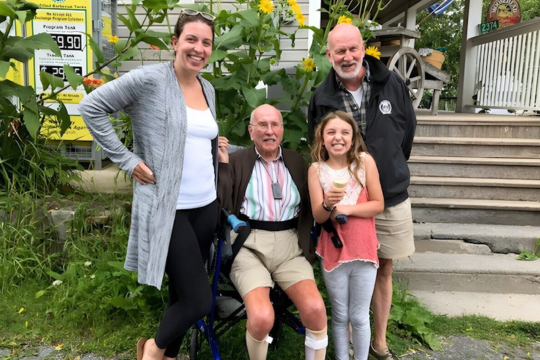
Donald Howson (centre) is pictured here with his granddaughter, Joanna, his great-granddaughter, Nina and his son, Geoff.
Geoff Howson looks back on the five years after his father had a severe stroke and how he dealt with being his father’s caregiver.
Geoff Howson considered himself lucky as a caregiver for his father. His father, Donald, was a chaplain and veteran of the Second World War and Korean War, and at the age of 98, Donald had a debilitating stroke while still living in his own home. Because of his father’s military service, Geoff was able access numerous supports that meant his dad was able to stay in his home until he was 101.
“My father had a very severe stroke in 2013,” says Geoff, an Anglican priest who was then working in Peterborough, Ont., where his father happened to also live at that time. “My father didn’t know all the benefits he could get as a veteran. You have to advocate because a lot of people like him have no idea what they’re entitled to.”
As it turned out, Geoff managed to get his father two caregivers that meant he could return to his own home after six months of rehab and he was able to stay for a few years.
“He couldn’t have stayed in his home as long as he did without [Veterans Affairs],” Geoff says. “And when he did go into a care home, Veterans Affairs allowed me to have a caregiver who would take him to his home regularly to hold court with his friends.”
Those friends also pitched in to help Geoff, driving him to events and arranging a weekly visit.
“Every week, they would gather at his home and arrange for something special for the Major,” Geoff says. “They assisted me immensely.”
During those same years, Geoff became the spiritual care co-ordinator at a long-term care home, which gave him a chance to see first-hand how things operated in such homes.
“That’s when I became aware that this was a fragile system,” says Geoff, who now lives in Bocabec, N.B., with his wife, Jan. “It also showed me that a lot of people didn’t have the resources that I was able to access for my dad.”
After the stroke, his father had problems swallowing and had to be very careful walking because his right side was paralyzed by the stroke and his mobility on that side didn’t return completely.
“He always had to use a walker and he hated it because he was a very proud and stubborn man,” Geoff says. “That’s another thing caregivers have to consider. For people who have been vibrant and alive, and are hit with a debilitating shortcoming, the caregiver also has to deal with their psychological and emotional needs — to find ways to help them accept what they've been hit with.”
The fortunate thing for the Howsons was the happenstance that Geoff had been offered a job there and while he didn’t expect to return to the town where his father retired after leaving the military, he had.
He remembers the difficulty of becoming power of attorney for his father after the stroke and finding out his father only had $424 in the bank.
“It was hard,” he says. “I had to get his finances in order. The biggest strain in the beginning was having to be firm with him, telling him his finances were a mess and it would take a while to sort it out.”
His father owned two homes and he had to clear one of them out.
“I got burned out mostly because he loved possessions,” Geoff says, adding that he also sold off some of his father’s art and antiques to help pay for his care. “I also had to be firm with him about getting rid of things. I was very tired by the end of it. But I know he was grateful that I’d been there for him.”
Howson says the bottom line of being a good caregiver is dealing with your own vulnerabilities and the vulnerabilities of the person you’re caring for.
“The other thing you have to give them is really active listening,” he says.

